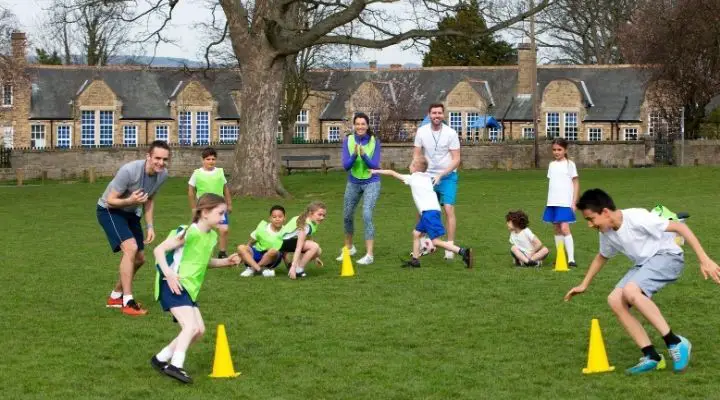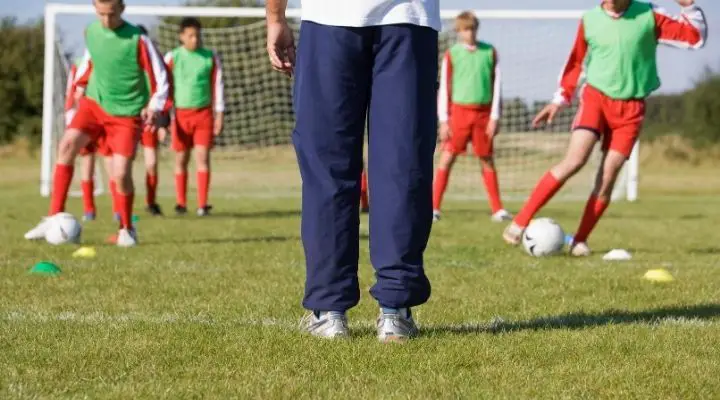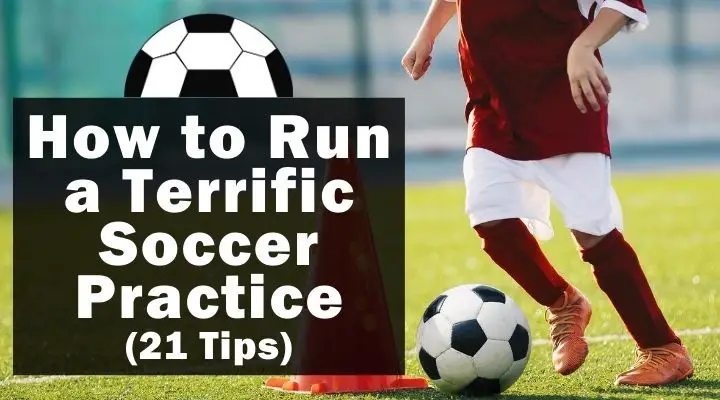How to Run a Terrific Soccer Practice (21 Tips)
As every coach is all too aware, you only have a limited amount of training sessions and contact time with your players before the next match rolls around all too quickly.
This means that it’s important to run a terrific soccer practice where everyone is engaged, having fun, learning new skills, and developing + progressing as players.
While each player, team, and coach have their own unique attributes and identities, there are many things you can do to ensure that everyone comes away feeling enthused and encouraged after soccer practice.
Planning and preparation are key to this as are the positive team environment you create, the praise you hand out, and the pragmatic and practical approach you take when the practice isn't working out and you need to shake things up.
With all this in mind, let's take a look at some tips on just how to run a terrific soccer practice, week after week, season after season.
We'll first focus on the planning and preparation side of things before moving on to how to keep things fun, fresh, and focused during the sessions themselves.
Planning and Preparation
Planning the session in advance and preparing well really are two of the main things that’ll ensure that both you and your players come away buzzing from yet another positive and productive soccer practice.
Each training session, however, and the season as a whole, draws on the rules and expectations you've set, the positive habits you've established, and the inclusive and encouraging team environment you've all created.
While it’s expected that players turn up on time, take training seriously, and give their all, it’s just as important that you keep their focus and attention with the drills you come up with and the session you run.
When planning and preparing a practice, here are some things to take into account:

Tip #1 - Plan What You Want to Work On
Players respond really well to seeing that you’ve put time and effort into making the soccer practice fun, engaging, and educational for them.
By having a list of drills on hand and an outline and focus for the session, you’re already setting yourself up for a terrific soccer practice.
Tip #2 - Focus Each Session on One or Two Areas
While it may be tempting to work on a lot of different techniques and tactics, some of the best soccer practices instead focus on just one or two different things.
This could see you working on both crossing and aerial work at the same time or one-on-one defending and shooting or ball control, passing, and movement.
Tip #3 - Vary Things Up
It’s important that a wide array of different drills are encompassed in the training session.
This will stop the players from getting bored and allow them to work on various parts of their game.
Changing drills regularly keeps things fun, fresh, and focused.
Tip #4 - Maximise Time on the Ball
These drills should ideally involve a ball as you want to maximise the amount of time that they’re passing, dribbling, controlling, and shooting as this will only help to improve their technique and touch.
This means it’s best to try and avoid exercises that only see one or two players touching the ball or have groups waiting around to play.
Tip #5 - Run Multiple Drills
It’s a good idea to run multiple drills at the same time and have the players move between them in small groups.
This keeps them engaged and interested, minimises the amount of waiting around, and gets them lots of touches of the ball.

Tip #6 - Run Drills that Use a Variety of Different Skills
Another option is to run drills that require them to use a variety of different skills.
This, too, helps to maximise what you achieve in the training session and gets them learning a number of skills from just one drill.
This, for instance, could see you run a passing drill that also incorporates first touch, ball control, positioning, and off-the-ball movement into it.
Tip #7 - Put on High Energy Practice Sessions
Running multiple drills and regularly changing exercises also help to keep the practice quick paced, energetic, and intense.
As well as making it more interesting, it prevents them from getting bored and losing focus.
Make sure not to overdo it and leave them exhausted and fed up!
Tip #8 - Tailor Each Session to Your Specific Players and Team
On this note, it’s important to highlight that the training session should be pitched at the right level for the group you’re working with.
Nothing is more frustrating and disheartening for players than being asked to do something that’s beyond their skill level or ability.
While it’s fine to push them a bit, make sure you encourage and praise them for their efforts and reward them afterwards.
Tip #9 - Throw In Fun Games and Competitions
After having challenged your players or worked them hard through a number of drills, it’s always a good idea to have a small competition or game.
This is always fun for the players and helps them refresh and relax after having had to concentrate and focus for so long.
This could be a juggling competition, practising penalties, or small-sided games.
Tip #10 - Make Training Competitive
Players of all ages love to test both themselves and each other, and so adding a competitive element to your training sessions is sure to enthuse and excite your team.
Not only will this see them try their best to impress you, but it’ll also help them improve as they work through exercises, hone their technique, and further their knowledge and understanding of the beautiful game.
Tip #11 - Don't Forget to Add in Both a Comprehensive Warm Up and Cool Down
As there’s nothing worse than picking up an injury and having to sit out a couple of matches, warm ups and cool downs are a key part of putting on a successful soccer practice.
These should take the players through a variety of different stretches, both dynamic and static, and get them jogging and running about, preferably with a ball.
As you can see, planning and preparing sessions in advance already goes a long way to making them a success.
While they should be challenging, focused, and well thought out, it’s also important that they’re fun and enjoyable and are something that the whole team looks forward to each week.
The aim isn’t only to improve the players on the pitch but to set a good example for them off the pitch by encouraging and supporting them to develop and progress as both players and people.
Now that we've looked at how planning and preparation are key to running a terrific soccer practice, let's move on to how to actually run the sessions.
Recommended Reading: 10 Soccer Warm Up Drills to Get Your Players Locked In
How to Run a Terrific Soccer Practice
As we've just seen, planning and preparing training sessions in advance really is essential if you want to make the most of every minute with your players.
This, however, can only take you so far.
The rest really depends on what you say and do during practices, how you set up and explain the drills, and how you manage, support, and praise the players.
To make sure that your preparatory work and planning doesn't go to waste, here are some tips on how to run a successful training session time after time:

Tip #12 - Welcome Your Players
At the start of each session, you should welcome your players with a smile on your face and inquire how they’re doing and how their day has gone.
The positive, inclusive, and encouraging example you set is key to your players feeling accepted and supported both as individuals and as a team, and this will enable them to play their best football.
Tip #13 - Set Out the Aims of the Session
After the players have gone through their warm up, it’s a good idea to bring them together and explain what you’ll be working on during the training session.
This helps them to focus and understand just exactly what it is you expect to see from them during the practice.
Tip #14 - Set Up the Drills Ahead of Time
Making players wait between drills is a sure way to lose their attention and focus and it’s best to try and set up the next exercise while they’re still working on the last one.
This not only saves you time but also creates a seamless transition from one drill to the other which keeps them engaged and excited about what’s to come.
Tip #15 - Know How to Explain the Drills
Just as important as setting up the exercises and minimising lines and waiting times is knowing how to explain the drills.
This will give the players a clear idea of what you’re looking for from them and avoid them feeling frustrated and confused if they don't understand the drill.
Tip #16 - Know When to Change Things Up
If you can see and feel that players are losing focus, that they've been working on the same drill for too long or that it’s too challenging for them, then it’s time for you to introduce a new exercise or game.
This will re-energise them, keep their attention, and make sure that you're not wasting time working on something that just isn't coming off.
Being flexible and knowing when to change things up is just as key as the planning and preparation that goes into the session beforehand.

Tip #17 - Praise the Players
Everyone loves to receive praise and hear something positive said about them. As such, you should be generous but genuine with your praise and highlight different players' contributions.
By praising players for working on their weaknesses, you'll encourage them to keep learning and developing and not be afraid of making mistakes.
Likewise, you should praise hard work and effort just as much if not more than technique and talent.
Tip #18 - Give Feedback and Correct Issues When You See Them
As players also want to keep developing and progressing, it’s important that you give feedback on how they’re doing and correct mistakes in technique when you see them.
After all, poor technique is one of the main reason why players miss so many easy goals.
But you don't want to micromanage and keep stopping the session as your explanation and demonstration on how the drill works should’ve been sufficient.
Good coaches give players enough freedom to express themselves and choose the opportune time to give feedback and correct what they’re doing.
Tip #19 - Deal with Behaviour Issues When They Arise
While a well planned out and well-paced training session should minimise the likelihood of your players getting bored, distracted, and acting out, behaviour issues do unfortunately arise from time to time.
After having dealt with any misbehaviour in a fair and consistent manner by referring to the rules and expectations you laid out at the start of the season, you then want to refocus the team and player's energy and attention to something more positive.
While dealing with behaviour problems is never pleasant, how you manage them is key to running consistently excellent soccer practices.
Tip #20 - Listen to Your Players
On this note, it’s important to highlight that communication really is a two-way street.
Coaches should not only listen to their players but take their feedback in hand and use their opinions to make training sessions even better.
Understanding how your players are feeling and acting on it helps create a positive team environment where everyone feels that they have a role to play and are respected and listened to.
Tip #21 - Have Fun!
While you want your team to take training seriously and work hard to become better soccer players, having fun is an absolutely key part of running terrific soccer practices.
You want to make them engaging and enjoyable as this will see all your players turn up with a smile on their face, raring to go.
Luckily enough, this is possibly the easiest thing to do as all players just want to get down to business and start kicking that ball around!
Check out these 10 fun games for inspiration!
Conclusion
As you can see, there are absolutely loads of things you can do to ensure that each soccer practice is better than the last.
While much of it boils down to just how much hard work and effort you put into preparing and planning sessions, equally important is how you manage the practices and engage with your players.
Creating a positive, encouraging and supportive team environment really is key as this will get everyone looking forward to your terrific soccer practice each and every week.
Read Next: How to Keep Players Focused During Soccer Training (20 Tips)

